Advisory Board
Meet the members of the Robert Wood Johnson Foundation Health Policy Fellows advisory board, who assess all applicants and select outstanding fellows each year based on the selection criteria and goals of the program:
Margarita Alegría, PhD
Chief, Department of Medicine, Massachusetts General Hospital / Boston, MA
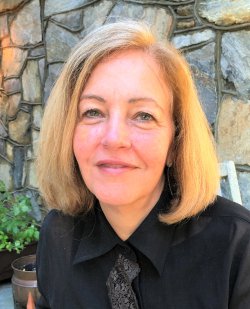 Margarita Alegría, PhD is the Chief of the Disparities Research Unit at Massachusetts General Hospital and the Mongan Institute, the Harry G. Lehnert, Jr. and Lucille F. Cyr Lehnert Endowed Chair at the Mass General Research Institute and a Professor in the Departments of Medicine and Psychiatry at Harvard Medical School. She has spent her career examining how to reduce health disparities for populations of color, immigrants, and linguistic minorities. Dr. Alegría is currently the PI of three National Institutes of Health (NIH)-funded research studies: Building Infrastructure for Community Capacity in Accelerating Integrated Care, Building Community Capacity for Disability Prevention for Minority Elders, and Latino Youths Coping with Discrimination: A Multi-Level Investigation in Micro- and Macro- Time. She is also PI of a Robert Wood Johnson Foundation grant assessing opportunities to establish institutional, policy and systemic changes to increase racial/ethnic diversity in academic health sciences. She has published over 300 papers, editorials, intervention training manuals, and several book chapters. In October 2011, she was elected as a member of the National Academy of Medicine in acknowledgement of her scientific contributions to her field. She has also been a recipient of notable awards such as the Simon Bolivar Award by the American Psychiatry Association (2009), the Rema Lapouse Award by the American Public Health Association (2020) and the Lifetime Achievement Award for Latino Behavioral Health Research by the National Latino Behavioral Health Association (2021). Most recently, Dr. Alegría received the 2022 Inclusive Voices Award by the American Association for Public Opinion Research. Dr. Alegría received her B.A. in Psychology from Georgetown University in 1978 and her Ph.D. from Temple University in 1989.
Margarita Alegría, PhD is the Chief of the Disparities Research Unit at Massachusetts General Hospital and the Mongan Institute, the Harry G. Lehnert, Jr. and Lucille F. Cyr Lehnert Endowed Chair at the Mass General Research Institute and a Professor in the Departments of Medicine and Psychiatry at Harvard Medical School. She has spent her career examining how to reduce health disparities for populations of color, immigrants, and linguistic minorities. Dr. Alegría is currently the PI of three National Institutes of Health (NIH)-funded research studies: Building Infrastructure for Community Capacity in Accelerating Integrated Care, Building Community Capacity for Disability Prevention for Minority Elders, and Latino Youths Coping with Discrimination: A Multi-Level Investigation in Micro- and Macro- Time. She is also PI of a Robert Wood Johnson Foundation grant assessing opportunities to establish institutional, policy and systemic changes to increase racial/ethnic diversity in academic health sciences. She has published over 300 papers, editorials, intervention training manuals, and several book chapters. In October 2011, she was elected as a member of the National Academy of Medicine in acknowledgement of her scientific contributions to her field. She has also been a recipient of notable awards such as the Simon Bolivar Award by the American Psychiatry Association (2009), the Rema Lapouse Award by the American Public Health Association (2020) and the Lifetime Achievement Award for Latino Behavioral Health Research by the National Latino Behavioral Health Association (2021). Most recently, Dr. Alegría received the 2022 Inclusive Voices Award by the American Association for Public Opinion Research. Dr. Alegría received her B.A. in Psychology from Georgetown University in 1978 and her Ph.D. from Temple University in 1989.
Judith B. Collins, RN, MS, WHNP-BC, FAAN
Associate Professor Emerita, School of Nursing, Virginia Commonwealth University / Richmond, VA
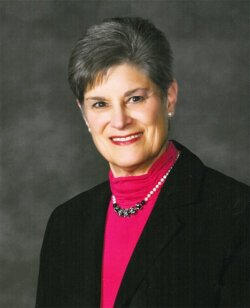 Judith B. Collins, RN, MS, WHNP-BC, FAAN, Founding Director of the comprehensive VCU Women’s Health Center at Stony Point Park (1993-2000) and Associate Professor Emerita, Schools of Nursing and Medicine, Virginia Commonwealth University, Medical College of Virginia Campus (VCU/MCV), Richmond, Virginia. Ms. Collins retired in 2000 after more than 30 years of service at the University. Ms. Collins earned her BSN from the University of North Carolina, Chapel Hill, 1962; MS in Maternal-Child Health from Boston University, 1968; and Women’s Health Nurse Practitioner Certificate from VCU/MCV, 1975, a program she co-initiated and directed. Throughout her nursing career, she has held positions in nursing services, administration, and education. She served on the Hospital Ship HOPE in Nicaragua, Central America in 1966-67. She was a Robert Wood Johnson Health Policy Fellow in Washington, D.C. in 1982-83 serving in the Congressional Office of Congressman Richard A. Gephardt. Following the Fellowship, Ms. Collins initiated the VCU/MCV Health Policy Office in the Office of the Vice President for Health Sciences to focus on governmental relations and health policy issues and education. She was the Director of the Health Policy Office from 1983-1993 and worked with members of the Virginia General Assembly on a wide range of health issues.
Judith B. Collins, RN, MS, WHNP-BC, FAAN, Founding Director of the comprehensive VCU Women’s Health Center at Stony Point Park (1993-2000) and Associate Professor Emerita, Schools of Nursing and Medicine, Virginia Commonwealth University, Medical College of Virginia Campus (VCU/MCV), Richmond, Virginia. Ms. Collins retired in 2000 after more than 30 years of service at the University. Ms. Collins earned her BSN from the University of North Carolina, Chapel Hill, 1962; MS in Maternal-Child Health from Boston University, 1968; and Women’s Health Nurse Practitioner Certificate from VCU/MCV, 1975, a program she co-initiated and directed. Throughout her nursing career, she has held positions in nursing services, administration, and education. She served on the Hospital Ship HOPE in Nicaragua, Central America in 1966-67. She was a Robert Wood Johnson Health Policy Fellow in Washington, D.C. in 1982-83 serving in the Congressional Office of Congressman Richard A. Gephardt. Following the Fellowship, Ms. Collins initiated the VCU/MCV Health Policy Office in the Office of the Vice President for Health Sciences to focus on governmental relations and health policy issues and education. She was the Director of the Health Policy Office from 1983-1993 and worked with members of the Virginia General Assembly on a wide range of health issues.
Throughout her over 40-year career as a Nurse Practitioner, Ms. Collins as has been engaged in practice, education, certification, regulation and professional organizations. She was appointed by the Governor to the Virginia Board of Nursing and the Joint Boards of Nursing and Medicine. In addition, she has served on multiple state and national task forces addressing advancement of Nurse Practitioner practice to the full extent of their education and training, including prescriptive authority, to meet the access to care needs for patients and their families.
Ms. Collins is a nationally known speaker, consultant and writer in the areas of women’s health care, health policy, and nurse practitioner issues. Ms.Collins co-authored a book chapter in Women’s Health, A Primary Care Clinical Guide entitled “Women and the Health Care System” and co-authored a chapter in the 2011, 6th Ed. and 2015, 7th Ed., Policy and Politics in Nursing and Health Care. She has served on multiple Boards and Task Forces focused on health policy issues including nursing and nurse practitioners, infant mortality, maternal-child health, indigent health care and health professional standards. Ms. Collins has been a leader in multiple nursing professional organizations including the American Nurses Association, Virginia Nurses Association, and Virginia Council of Nurse Practitioners.
Ms. Collins has held leadership positions in many community and professional organizations on the local, state, and national levels. She was the first Chair of the National Alliance of Nurse Practitioners that evolved into the America College of Nurse Practitioners; National Vice-President of NAACOG (now AWHONN); Vice President, The National Certification Corporation (NCC) for Obstetric, Gynecologic and Neonatal Nurses; Board Member, National Center for Certification, Preparation and Review (CCPR); Board Member, American College of Nurse Midwives Certification Council; Founding Board Member and Chair, Women’s Health Virginia; Chair, Virginia Capital Area March of Dimes; Board Member and Co-Chair of the Advisory Council, The YWCA of Richmond; Trustee, The Children’s Hospital; Past Chair and Trustee, Richmond Memorial Health Foundation; Past Chair, Virginia Council on the Status of Women Board (appointed by the Governor); Board Member, Centralized Credentialing Verification Service, Inc. of the Richmond Academy of Medicine; Advisory Board to the Nurse Leadership Institute of Virginia; Trustee and Chair, Development Committee MCV Foundation; Advisory Board, Children’s Hospital at VCU.
In retirement, Ms. Collins has remained very active as a volunteer on many university, community, state and national boards and foundations. She and her husband, Joseph Teefey have enjoyed traveling and being involved with their children and 6 grandchildren including a set of triplets!
Michelle Dennison, PhD, RD/LD, BC-ADM, CDE
Vice President, Policy, Diabetes and Prevention, Oklahoma City Indian Clinic / Oklahoma City, OK
 Michelle Dennison PhD, RD/LD, BC-ADM, CDE, is the Health Policy Liaison and Metabolic Care Center Administrator at the Oklahoma City Indian Clinic. She is responsible for developing effective relationships that lead to health policies that benefit the American Indian population specifically around diabetes/diabetes prevention, HIV and chronic disease prevention/health promotion. She also manages federal and private foundation grants for the Oklahoma City Indian Clinic. Dr. Dennison is a previous Robert Wood Johnson Foundation Health Policy Fellow. During her Fellowship, Dr. Dennison was placed in the office of the U.S. Surgeon General.
Michelle Dennison PhD, RD/LD, BC-ADM, CDE, is the Health Policy Liaison and Metabolic Care Center Administrator at the Oklahoma City Indian Clinic. She is responsible for developing effective relationships that lead to health policies that benefit the American Indian population specifically around diabetes/diabetes prevention, HIV and chronic disease prevention/health promotion. She also manages federal and private foundation grants for the Oklahoma City Indian Clinic. Dr. Dennison is a previous Robert Wood Johnson Foundation Health Policy Fellow. During her Fellowship, Dr. Dennison was placed in the office of the U.S. Surgeon General.
Dr. Dennison has extensive experience in providing quality diabetes and diabetes prevention programming. She is a founder of the renowned Native Youth Preventing Diabetes Coalition and Oklahoma Intertribal Diabetes Coalition. She is a previous awardee of the National Congress of American Indians Graduate Health Fellowship, the National Indian Health Board’s Area/Regional Impact Award, and the Indian Health Service’s award for Exceptional Performance for Health Promotion and Wellness. She also served as a co-author for the American Diabetes Association's Nutrition Therapy for Adults with Diabetes or Pre-Diabetes: A Consensus Report. She is currently assisting with planning for the National Association of Diabetes Care and Education Specialists 2021 annual meeting and serves as the ADCES local Grassroots Coordinator. Michelle is also contributing to the National Diabetes Self Management Education Standards Revision and is the author of the American Indian Food and Culture Chapter of the Academy for Nutrition and Dietetics Food and Culture Book (in-review).
Julie A. Freischlag, MD, FACS, FRCSEd(Hon), DFSVS, MAMSE
Chief Executive Officer, Wake Forest Baptist Health / Wake Forest, NC
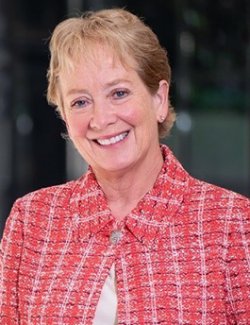 Julie A. Freischlag, MD, FACS, FRCSEd(Hon), DFSVS, MAMSE is the chief academic officer and executive vice president of Advocate Health, chief executive officer of Atrium Health Wake Forest Baptist, and executive vice president for health affairs at Wake Forest University. As chief academic officer, Freischlag oversees research and discovery for the entire Advocate Health system, including all educational and research programs at Wake Forest University School of Medicine, Atrium Health Cabarrus College of Health Sciences and Atrium Health Carolinas College of Health Sciences.
Julie A. Freischlag, MD, FACS, FRCSEd(Hon), DFSVS, MAMSE is the chief academic officer and executive vice president of Advocate Health, chief executive officer of Atrium Health Wake Forest Baptist, and executive vice president for health affairs at Wake Forest University. As chief academic officer, Freischlag oversees research and discovery for the entire Advocate Health system, including all educational and research programs at Wake Forest University School of Medicine, Atrium Health Cabarrus College of Health Sciences and Atrium Health Carolinas College of Health Sciences.
As CEO of Atrium Health Wake Forest Baptist, Freischlag has the overall responsibility for the health system’s clinical, academic and innovation enterprises and its annual operating budget of more than $4 billion. Ranked among the nation’s top medical centers, Wake Forest Baptist includes a growing, multi-hospital health system and physician network, the state-of-the-art and highly competitive Wake Forest University School of Medicine, and the school’s technology transfer and commercialization arm, Wake Forest Innovations. Freischlag served as the dean of Wake Forest University School of Medicine from 2018 until February 2023 and previously was vice chancellor for Human Health Sciences and dean of the School of Medicine at UC Davis.
Freischlag has helped to drive change in academic medicine with a deep commitment to diversity and inclusion. For more than 15 years, she has led education and training programs at top medical schools in her role as professor and chair of surgery and vascular surgery departments. Freischlag also has more than 30 years of experience leading patient-care services as chief of surgery or vascular surgery at nationally ranked hospitals. She served as professor, chair of the surgery department and surgeon-in-chief at Johns Hopkins Medical Institutions. She led initiatives to expand research, add specialty clinical services, improve patient-centered care and patient safety, redesign the surgical training program and enhance academic career paths for faculty.
Her national leadership includes serving as a former governor and secretary of the Board of Governors and a regent and past chair of the Board of Regents of the American College of Surgeons. She is the past president of the Society for Vascular Surgery and the Society for Vascular Surgery Foundation, and past president of the Association of VA Surgeons and the Society of Surgical Chairs. Freischlag was the editor of JAMA Surgery for ten years (2005-2014) and is currently a member of the JAMA Oversight Committee and the editorial boards of the Annals of Vascular Surgery, Journal of the American College of Surgeons, British Journal of Surgery, and the Journal of the American Medical Association.
She has published more than 300 manuscripts, abstracts and book chapters, primarily addressing the treatment of thoracic outlet syndrome, abdominal aortic aneurysms, carotid artery disease and peripheral vascular disease utilizing outcome data and clinical trials; additionally, she has published on burnout and work-life balance.
Freischlag is an internationally recognized expert in the treatment of thoracic outlet syndrome which can require a specialized surgical procedure. She continues to evaluate and treat thoracic outlet syndrome patients and evaluates their results in a registry. Freischlag has received numerous teaching and achievement awards, including the 2023 Lifetime Achievement Award from the Society for Vascular Surgery, an achievement award from the Department of Veterans Affairs and the Trailblazer Award from the Society of University Surgeons. She was elected to the National Academy of Medicine in 2015, and in October 2021, she was inducted into the Academy of Master Surgeon Educators.
She mentors students, residents and young faculty and is a frequent speaker on topics ranging from her expertise in vascular diseases, teamwork and patient safety, leadership and work-life balance to women succeeding in health professions. Freischlag has dedicated her career to serving as a role model for her students, a respected colleague across health professions, a strong community leader and a national voice for improving health and health care.
Freischlag is the immediate Past President for the American College of Surgeons. Currently, she serves on the Board of Directors of the Association for American Medical Colleges, becoming the Chair-elect in November 2023, National Institute of Health Clinical Center Research Hospital Board, Aga Khan University Board of Trustees and chair of the Health Services Committee, University of Pittsburgh School of Medicine Board of Visitors, and the University of Illinois Health Advisory Council.
G. William Hoagland, MS
Senior Vice President, Bipartisan Policy Center / Washington, DC
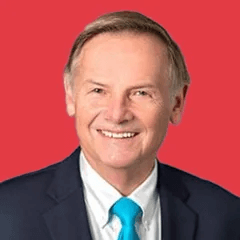 William Hoagland is a BPC senior vice president. In this capacity, he helps direct and manage fiscal, health, and economic policy analyses.
William Hoagland is a BPC senior vice president. In this capacity, he helps direct and manage fiscal, health, and economic policy analyses.
Before joining BPC in September 2012, Hoagland served as vice president of public policy for CIGNA Corporation, working with business leaders, trade associations, business coalitions, and interest groups to develop CIGNA policy on health care reform issues at both the federal and state levels.
Prior to joining CIGNA, Hoagland completed 33 years of federal government service, including 25 years on the U.S. Senate staff. From 2003 to 2007, he served as the director of budget and appropriations in the office of Senate Majority Leader Bill Frist. He assisted in evaluating the fiscal impact of major legislation and helped to coordinate budget policy for the Senate leadership.
From 1982 to 2003, Hoagland served as a staff member and director of the Senate Budget Committee, reporting to U.S. Sen. Pete V. Domenici, chairman and ranking member of the committee during this period. He participated in major federal budget negotiations, including the 1985 Gramm-Rudman-Hollings Budget Deficit Reduction Act, the 1990 Omnibus Budget Reconciliation Act, and the historic 1997 Balanced Budget Agreement.
In 1981, he served as the administrator of the Department of Agriculture’s Food and Nutrition Service and as a special assistant to the Secretary of Agriculture. He was one of the first employees of the Congressional Budget Office in 1975, working with its first director, Alice Rivlin.
In both 1997 and 2005, National Journal listed him as one of the “Washington 100 Decision Makers” and referred to him as a “bottom-liner who is not a hard-liner.” Roll Call consistently named Hoagland as one of the top 50 Hill staffers. In 2002, he received the James L. Blum Award for Distinguished Service in Budgeting. The National Association of State Budget Officers honored him in 2004 with its Leadership in Budgeting Award, and in 2006 he was inducted as a fellow in the National Academy of Public Administration.
Hoagland is an affiliate professor of public policy at the George Mason University and a board member of the Committee for a Responsible Federal Budget, the National Academy of Social Insurance, and the National Advisory Committee to the Workplace Flexibility 2010 Commission. In 2009, he was appointed to the Peterson-Pew Commission on Budget Reform examining the overall structure of the budget, authorization, and appropriations process, and was a member of BPC’s Debt Reduction Task Force that published Restoring America’s Future in November 2010. He coordinated BPC’s 2013 report, A Bipartisan Rx for Patient-Centered Care and System-Wide Cost Containment. In April 2015, he co-chaired the National Academy of Social Insurance report, “Addressing Pricing Power in Health Care Markets.”
Hoagland attended the U.S. Merchant Marine Academy and holds degrees from Purdue University and The Pennsylvania State University. His family’s Indiana family farm was recognized as a “Hoosier Homestead” for having remained in the family for over a century.
Lisa Kaplowitz, MD, MSHA
Consultant, Virginia Department of Health / Arlington, VA
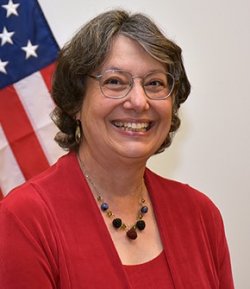 Lisa Kaplowitz is Public Health Physician and Deputy Health Officer for Arlington County, Virginia, a position she has held since April, 2019. Prior to this position, she had a number of positions within the US Department of Health and Human Services from 2010-2019. From October, 2015-March, 2019, she served as Senior Medical Advisor both within the Office of the Assistant Secretary for Preparedness and Response (ASPR) addressing issues related to healthcare response to emergency events, and in the Substance Abuse and Mental Health Services Administration (SAMHSA), focusing on HIV/AIDS and hepatitis policy issues, both domestic and international, as well as healthcare professional training on opioid issues. From March, 2010-October, 2015 she was Deputy Assistant Secretary for Policy in the Office of the Assistant Secretary for Preparedness and Response, responsible for directing and coordinating policy and strategic planning for the Office of the ASPR. From July, 2008 until February, 2010, Dr. Kaplowitz was Director of the Health Department for the City of Alexandria in Northern Virginia, responsible for all public health activities in the city and involved in emergency preparedness in the National Capital Region. From 2002 until July, 2008, she was Deputy Commissioner for Emergency Preparedness and Response (EP&R) in the Virginia Department of Health (VDH), responsible for the development and implementation of Virginia’s public health and medical response to all natural and man made emergencies, in coordination with hospitals, health care systems and emergency response organizations in Virginia and the National Capital Region.
Lisa Kaplowitz is Public Health Physician and Deputy Health Officer for Arlington County, Virginia, a position she has held since April, 2019. Prior to this position, she had a number of positions within the US Department of Health and Human Services from 2010-2019. From October, 2015-March, 2019, she served as Senior Medical Advisor both within the Office of the Assistant Secretary for Preparedness and Response (ASPR) addressing issues related to healthcare response to emergency events, and in the Substance Abuse and Mental Health Services Administration (SAMHSA), focusing on HIV/AIDS and hepatitis policy issues, both domestic and international, as well as healthcare professional training on opioid issues. From March, 2010-October, 2015 she was Deputy Assistant Secretary for Policy in the Office of the Assistant Secretary for Preparedness and Response, responsible for directing and coordinating policy and strategic planning for the Office of the ASPR. From July, 2008 until February, 2010, Dr. Kaplowitz was Director of the Health Department for the City of Alexandria in Northern Virginia, responsible for all public health activities in the city and involved in emergency preparedness in the National Capital Region. From 2002 until July, 2008, she was Deputy Commissioner for Emergency Preparedness and Response (EP&R) in the Virginia Department of Health (VDH), responsible for the development and implementation of Virginia’s public health and medical response to all natural and man made emergencies, in coordination with hospitals, health care systems and emergency response organizations in Virginia and the National Capital Region.
During the 20 years prior to joining VDH, Dr. Kaplowitz was a faculty member in the Department of Medicine at Virginia Commonwealth University (VCU), focused on HIV/AIDS clinical care and education, as well as supporting community based organizations and Ryan White programs statewide. She was Director of the VCU HIV/AIDS Center and the Mid-Atlantic AIDS Education and Training Center, as well as Medical Director of Telemedicine and Ambulatory Care for the VCU Health System. She obtained her MD degree from the University of Chicago Pritzker School of Medicine, and completed her residency in Internal Medicine and Fellowship in Infectious Diseases at the University of North Carolina. She was a health policy fellow with the Institute of Medicine (now National Academy of Medicine) in Washington D.C. in 1996-1997, working in Senator Jay Rockefeller’s Office on health financing and end of life care. Dr. Kaplowitz completed a Masters of Science in Health Administration (MSHA) at VCU in 2002. In addition to public health and emergency preparedness, she has a strong interest in health policy, health care financing, improving access to health care and addressing social determinants of health.
Janice Phillips, PhD, RN, CENP, FAAN
Associate Professor, Department of Community, Systems and Mental Health Nursing, College of Nursing; Director, Nursing Research and Health Equity, Rush University / Chicago, IL
 Janice Phillips PhD, RN, CENP, FAAN, completed the Robert Wood Johnson Health Policy Fellowship in 2011 working in the office of Senator John D. Rockefeller IV (D-VA) where she analyzed complex data in support of the Patient Protection and Affordable Care Act and prescription drug abuse legislation. From 2013-2017, Janice assumed the role of Director of Government and Regulatory Affairs at CGFNS International where she helped position the organization in receiving their 5-year reauthorization from the U.S. Citizenship and Immigration Services to issue Visa Screen® certificates to foreign educated health care professionals and securing first time NGO Consultative Status with the United Nations. Since 2017, as the Director of Nursing Research and Health Equity at Rush University Medical Center and an Associate Professor in the College of Nursing, Dr. Phillips serves as a system wide leader in supporting health equity as a shared goal and integrating health equity across the Rush Health system’s education, research, and clinical endeavors. She is the author of over 100 publications, 5 edited textbooks, and the inaugural health policy columnist for the Minority Nurse magazine. Her OpEds have appeared in Scientific American, the Hill, and U.S. News and World Report. Janice is a member of the American Academy of Nursing and the recipient of numerous awards including the Martin Luther King Jr. Humanitarian Award, the Nursing Spectrum Advancing and Leading the Profession Award and the Marcia Pencak Murphy Presidential Mentorship Award. In 2019, HHS Secretary Xavier Becerra appointed Janice to serve on the National Advisory Council of Nursing Education and Practice and in 2020, Illinois Governor J.B. Pritzker appointed her to serve on the Illinois State Board of Health. Dr. Phillips holds a BSN from North Park College, an MS in Community Health from St. Xavier School of Nursing, and a PhD in Nursing from the University of Illinois, College of Nursing.
Janice Phillips PhD, RN, CENP, FAAN, completed the Robert Wood Johnson Health Policy Fellowship in 2011 working in the office of Senator John D. Rockefeller IV (D-VA) where she analyzed complex data in support of the Patient Protection and Affordable Care Act and prescription drug abuse legislation. From 2013-2017, Janice assumed the role of Director of Government and Regulatory Affairs at CGFNS International where she helped position the organization in receiving their 5-year reauthorization from the U.S. Citizenship and Immigration Services to issue Visa Screen® certificates to foreign educated health care professionals and securing first time NGO Consultative Status with the United Nations. Since 2017, as the Director of Nursing Research and Health Equity at Rush University Medical Center and an Associate Professor in the College of Nursing, Dr. Phillips serves as a system wide leader in supporting health equity as a shared goal and integrating health equity across the Rush Health system’s education, research, and clinical endeavors. She is the author of over 100 publications, 5 edited textbooks, and the inaugural health policy columnist for the Minority Nurse magazine. Her OpEds have appeared in Scientific American, the Hill, and U.S. News and World Report. Janice is a member of the American Academy of Nursing and the recipient of numerous awards including the Martin Luther King Jr. Humanitarian Award, the Nursing Spectrum Advancing and Leading the Profession Award and the Marcia Pencak Murphy Presidential Mentorship Award. In 2019, HHS Secretary Xavier Becerra appointed Janice to serve on the National Advisory Council of Nursing Education and Practice and in 2020, Illinois Governor J.B. Pritzker appointed her to serve on the Illinois State Board of Health. Dr. Phillips holds a BSN from North Park College, an MS in Community Health from St. Xavier School of Nursing, and a PhD in Nursing from the University of Illinois, College of Nursing.
Jason Q. Purnell, PhD, MPH
President, James S. McDonnell Foundation / St. Louis, MO
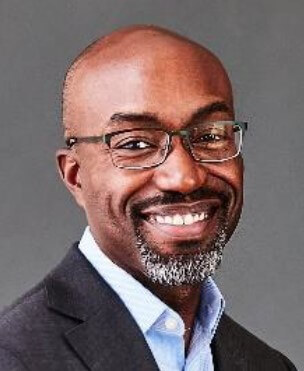 Dr. Jason Q. Purnell joined the James S. McDonnell Foundation as president in 2023. He came to the foundation from BJC HealthCare, where he led the establishment of the Community Health Improvement strategy for one of the nation’s largest nonprofit health systems, beginning in 2020. Working with his team, systemwide colleagues, and a broad group of community partners, Purnell launched health equity efforts to address the physical, emotional, and financial health of those most impacted by unequal access to life-sustaining resources and opportunities. He also introduced an anchor institution agenda for BJC that included significant investments in community and economic development and commitments to hiring and purchasing in 22 zip codes with at least 20% poverty rates and majority Black populations.
Dr. Jason Q. Purnell joined the James S. McDonnell Foundation as president in 2023. He came to the foundation from BJC HealthCare, where he led the establishment of the Community Health Improvement strategy for one of the nation’s largest nonprofit health systems, beginning in 2020. Working with his team, systemwide colleagues, and a broad group of community partners, Purnell launched health equity efforts to address the physical, emotional, and financial health of those most impacted by unequal access to life-sustaining resources and opportunities. He also introduced an anchor institution agenda for BJC that included significant investments in community and economic development and commitments to hiring and purchasing in 22 zip codes with at least 20% poverty rates and majority Black populations.
Dr. Purnell’s work at BJC built upon his scholarship and leadership as a faculty member in the Brown School at Washington University in St. Louis. He joined the Brown School in 2009 as a research assistant professor in the Health Communication Research Laboratory, was appointed assistant professor in 2011, and was promoted to associate professor with tenure in 2017. In 2014, Dr. Purnell and a team of colleagues at Washington University and Saint Louis University released For the Sake of All, a landmark report on the health and well-being of African Americans in St. Louis. It remains an essential work for those seeking to understand how race and place have shaped the health and life outcomes of the region; has inspired numerous policy and programmatic innovations; and is taught in curricula ranging from Pre-K to graduate-level courses.
A 2018 follow-on report, Segregation in St. Louis: Dismantling the Divide, helped to launch an affordable housing trust fund for St. Louis County, among several of its recommendations that have since been enacted. In addition to his community-engaged scholarship, Dr. Purnell was a highly regarded course instructor in both the public health and social work graduate programs and published 40 peer-reviewed papers in journals like JAMA, Annual Review of Public Health, Journal of Clinical Oncology, and American Journal of Public Health. Media coverage of his work and his commentary has appeared in the Washington Post, CNN.com, Huffington Post, Bloomberg BusinessWeek, NPR, The Atlantic, FOX Business News, St. Louis Post-Dispatch, St. Louis American, Riverfront Times, and St. Louis Magazine.
Dr. Purnell graduated magna cum laude from Harvard University with a bachelor of arts degree in government and philosophy. His doctoral studies were completed at The Ohio State University, and his masters in public health as well as a postdoctoral fellowship in cancer prevention and control at the University of Rochester School of Medicine and Dentistry. He is a member of the Roundtable on Population Health Improvement in the National Academies of Sciences, Engineering, and Medicine and the Advisory Board of the Robert Wood Johnson Foundation Health Policy Fellows program. In 2021, he was recognized by Modern Healthcare as one of the Top 25 Diverse Healthcare Leaders in the country. Local honors include being named Person of the Year by the St. Louis American and receiving the FOCUS St. Louis Leadership Award, both in 2016.
Avik Roy, MD
President, The Foundation for Research on Equal Opportunity / Austin, TX
 Public policy is Avik Roy’s fourth career, but clearly his favorite one. Avik was born to Indian immigrants in Rochester, Michigan, a place that instilled in him a lifelong fondness for the Michigan Wolverines and the Detroit Red Wings. He finished high school in San Antonio, Texas, where USA Today named him to its All-USA High School Academic First Team, honoring the top 20 seniors in the country.
Public policy is Avik Roy’s fourth career, but clearly his favorite one. Avik was born to Indian immigrants in Rochester, Michigan, a place that instilled in him a lifelong fondness for the Michigan Wolverines and the Detroit Red Wings. He finished high school in San Antonio, Texas, where USA Today named him to its All-USA High School Academic First Team, honoring the top 20 seniors in the country.
After training as a scientist at MIT and as a physician at Yale Medical School, Avik moved to Boston to join a then-unknown investment firm called Bain Capital, where he focused on identifying biotechnology companies developing therapies for diseases that had heretofore gone untreated.
In 2009, as President Obama’s health reform bill was being debated in Congress, Avik started a blog about health care policy. “I couldn’t find anything to read that I agreed with, so I started writing it myself.” Avik’s blog, The Apothecary, was soon picked up by Reihan Salam at National Review, and Matt Herper at Forbes. In 2012, Avik joined Mitt Romney’s presidential campaign as a health care policy advisor. By 2014, Avik was Forbes’ Opinion Editor, and Meet the Press’ Chuck Todd was calling Avik “the go-to policy wonk critic of the health care law…the guru.”
But Avik wasn’t content merely to criticize the Affordable Care Act. He’s a passionate believer in the free-market case for universal coverage: the idea that choice and competition can bring quality health care to every American. His health reform plan, Medicare Advantage for All: A Patient-Centered Plan for Universal Coverage and Permanent Fiscal Solvency, is one of FREOPP’s flagship publications.
In 2015, Avik and his then-fiancée, Sarah, moved to Austin, where he ran the foreign and domestic policy shops for Texas Governor Rick Perry’s presidential campaign. In that capacity, Avik was also the lead author of Gov. Perry’s major policy speeches. The Wall Street Journal called Perry’s address on intergenerational black poverty “the speech of the campaign so far.” Later in the primaries, Avik advised Florida Senator Marco Rubio.
2016’s political outcomes convinced Avik that the same-old, same-old wasn’t working. “Both parties are failing to work for people who are struggling in the twenty-first century economy,” says Avik, FREOPP’s President. “That’s why FREOPP focuses exclusively on research that moves the needle for people with below-median incomes or net worth.”
In a November 2016 profile in The Atlantic, Avik spoke passionately about America’s unique tradition of diversity and liberty. “A son of…immigrants who gets into Harvard [represents] the best of America,” he said. “That’s what America is.” Avik has been a central figure in the debate over how to respond to the COVID-19 pandemic. The plan he developed with his FREOPP colleagues for reopening the U.S. economy while COVID-19 endures changed the debate about whether partial reopenings were possible in the spring and summer of 2020. A second plan, focused on safely reopening schools and colleges, shaped policies around the country in the fall of that year. “A source close to the White House said officials were closely watching his recommendations for addressing the coronavirus pandemic,” noted Business Insider in 2020.
Avik’s work on prescription drug costs, including The Competition Prescription: A Market-Based Plan for Affordable Drugs and What Medicare Can Learn From Other Countries on Drug Pricing, has been a key source of ideas for Congress, and has heavily influenced the prescription drug reform agenda advanced by U.S. Health and Human Services Secretary Alex Azar.
Avik’s paper on reducing hospital prices, Affordable Hospital Care Through Competition and Price Transparency, was turned into a bill by Indiana Rep. Jim Banks called the Hospital Competition Act of 2019. Another bill, Rep. Bruce Westerman’s Fair Care Act of 2020, embodies the broad range of ideas in the Medicare Advantage for All initiative.
Avik also writes frequently on the rise of Bitcoin and decentralized finance. His 2021 National Affairs article, Bitcoin and the U.S. Fiscal Reckoning, has been described as a “tour de force” articulating “the most important arguments for why the United States should embrace Bitcoin” as a way to protect Americans from inflation. He serves on the Boards of Advisors of the Bitcoin Policy Institute and Sats Center, and on the Board of Directors of the Texas Bitcoin Foundation.
Avik and Sarah still live in Austin, with their two young children.
Mark D. Smith, MD, MBA, chair
Professor of Clinical Medicine, University of California / San Francisco, CA
 Mark D. Smith, MD, MBA, is currently a Professor of Clinical Medicine at the University of California at San Francisco. From 2015 to 2019 he served as co-chair of the Guiding Committee of the Health Care Payment Learning and Action Network. From 1996 to 2013, Dr. Smith was the Founding President and Chief Executive Officer of the California Healthcare Foundation, a philanthropic organization focused on improving the health of Californians. In those 17 years, Smith helped build the Foundation into a recognized leader in delivery system innovation, public reporting of care quality, and applications of new technology in health care. Before CHCF, Dr. Smith was Executive Vice-President of the Henry J. Kaiser Family Foundation, where he oversaw programs in HIV, Reproductive Health, and the Health Care Marketplace. Prior to that, he was on the faculty at the Johns Hopkins Schools of Medicine and of Public Health and directed the AIDS clinic there.
Mark D. Smith, MD, MBA, is currently a Professor of Clinical Medicine at the University of California at San Francisco. From 2015 to 2019 he served as co-chair of the Guiding Committee of the Health Care Payment Learning and Action Network. From 1996 to 2013, Dr. Smith was the Founding President and Chief Executive Officer of the California Healthcare Foundation, a philanthropic organization focused on improving the health of Californians. In those 17 years, Smith helped build the Foundation into a recognized leader in delivery system innovation, public reporting of care quality, and applications of new technology in health care. Before CHCF, Dr. Smith was Executive Vice-President of the Henry J. Kaiser Family Foundation, where he oversaw programs in HIV, Reproductive Health, and the Health Care Marketplace. Prior to that, he was on the faculty at the Johns Hopkins Schools of Medicine and of Public Health and directed the AIDS clinic there.
He was elected to the Institute of Medicine (now National Academy of Medicine) in 2001 and chaired the IOM’s Committee on the Learning Healthcare System, which produced the widely publicized 2012 report Best Care at Lower Cost. Dr. Smith serves as a Director of Teladoc Health, Inc., Phreesia, the Commonwealth Fund, the Institute for Healthcare Improvement, and Prealize. He earned his BA degree in Afro-American Studies from Harvard College, his M.D. from University of North Carolina at Chapel Hill, and his M.B.A. in Healthcare Administration from the University of Pennsylvania. He maintains a clinical practice in HIV at the Positive Health Practice at Zuckerberg San Francisco General Hospital. He and his wife live in Oakland, California.
Josh Trent, MA
Managing Principal, Leavitt Partners / Washington, DC

Josh Trent is a managing principal based in Leavitt Partners’ Washington, D.C. office. Josh has more than a decade and a half of experience in the federal government—from the White House to the U.S. Department of Health and Human Services, to the U.S. Senate and U.S. House on Capitol Hill.
In his role at Leavitt Partners, Josh develops and manages multi-sector alliances and advises clients throughout the health care sector on federal health care policy and strategy. He specializes in public insurance under Medicare, Medicaid, the Children’s Health Insurance Program, commercial health insurance, the 340B program, and the Affordable Care Act.
Prior to joining Leavitt Partners, Josh served as Chief Health Counsel for Chairman Greg Walden of the Committee on Energy and Commerce of the U.S. House of Representatives. In that role, Josh was the lead House staffer for the landmark legislation to combat the opioid crisis, The SUPPORT Act (P.L. 115-271). He also led the House’s work to reauthorize The Pandemic and All-Hazards Preparedness Act, which was eventually enacted the following year (P.L. 116-22).
Josh previously served under both Walden and Chairman Fred Upton as Deputy Chief Health Counsel. In this role, he played a key part in crafting the Medicaid, Medicare, and state Children’s Health Insurance Program (CHIP) provisions in the House’s Bipartisan Budget Act (P.L. 115-123), and he led the House’s work to enact the longest extension of the CHIP in the history of the program (P.L. 115-120). Previously, as Professional Staff under Chairman Upton, Josh assisted in the development and passage of the Comprehensive Addiction and Recovery Act (P.L. 114-198) and the sweeping law to advance the discovery, development, and delivery of cures and treatments, The 21st Century Cures Act (P.L.114-255).
Prior to working in the House, Josh served for five years as Health Policy Advisor for U.S. Senator Tom Coburn (R-OK). In that role, Josh was involved in the legislative process leading to the enactment of the Affordable Care Act.
Before coming to Capitol Hill, Josh spent six years in the administration of President George W. Bush, including three years as an executive recruiter in the Office of Presidential Personnel at the White House helping identify and recruit individuals for senior Administration roles. He also spent a year and a half as deputy director of the Office of Refugee Resettlement at the U.S. Department of Health and Human Services.
Josh received his Bachelor of Arts from Union University and received his master’s degree in international politics from the University of Bath in Bath, England.
Sten Vermund, MD, PhD
Anna M.R. Lauder Professor of Public Health; Professor of Pediatrics, Yale University / New Haven, CT
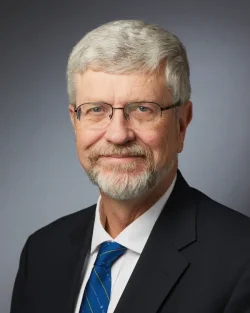 Dr. Sten Vermund is a pediatrician and infectious disease epidemiologist focused on diseases of low and middle income countries. His work on HIV-HPV interactions among women in Bronx methadone programs motivated a change in the 1993 CDC AIDS case surveillance definition and inspired cervical cancer screening programs launched within HIV/AIDS programs around the world. The thrust of his research has focused on health care access, adolescent sexual and reproductive health and rights, and prevention of HIV transmission among general and key populations, including mother-to-child. Dr. Vermund has become increasingly engaged in health policy, particularly around sustainability of HIV/AIDS programs and their expansion to non-communicable diseases, coronavirus pandemic response and prevention, and public health workforce development. His recent grants include capacity-building for public health in Chad, molecular epidemiology for HIV in Kazakhstan, and COVID-19 vaccine studies in Dominican Republic and Connecticut. He has worked with schools and arts organizations for COVID-19 risk mitigation and institutional safety.
Dr. Sten Vermund is a pediatrician and infectious disease epidemiologist focused on diseases of low and middle income countries. His work on HIV-HPV interactions among women in Bronx methadone programs motivated a change in the 1993 CDC AIDS case surveillance definition and inspired cervical cancer screening programs launched within HIV/AIDS programs around the world. The thrust of his research has focused on health care access, adolescent sexual and reproductive health and rights, and prevention of HIV transmission among general and key populations, including mother-to-child. Dr. Vermund has become increasingly engaged in health policy, particularly around sustainability of HIV/AIDS programs and their expansion to non-communicable diseases, coronavirus pandemic response and prevention, and public health workforce development. His recent grants include capacity-building for public health in Chad, molecular epidemiology for HIV in Kazakhstan, and COVID-19 vaccine studies in Dominican Republic and Connecticut. He has worked with schools and arts organizations for COVID-19 risk mitigation and institutional safety.
